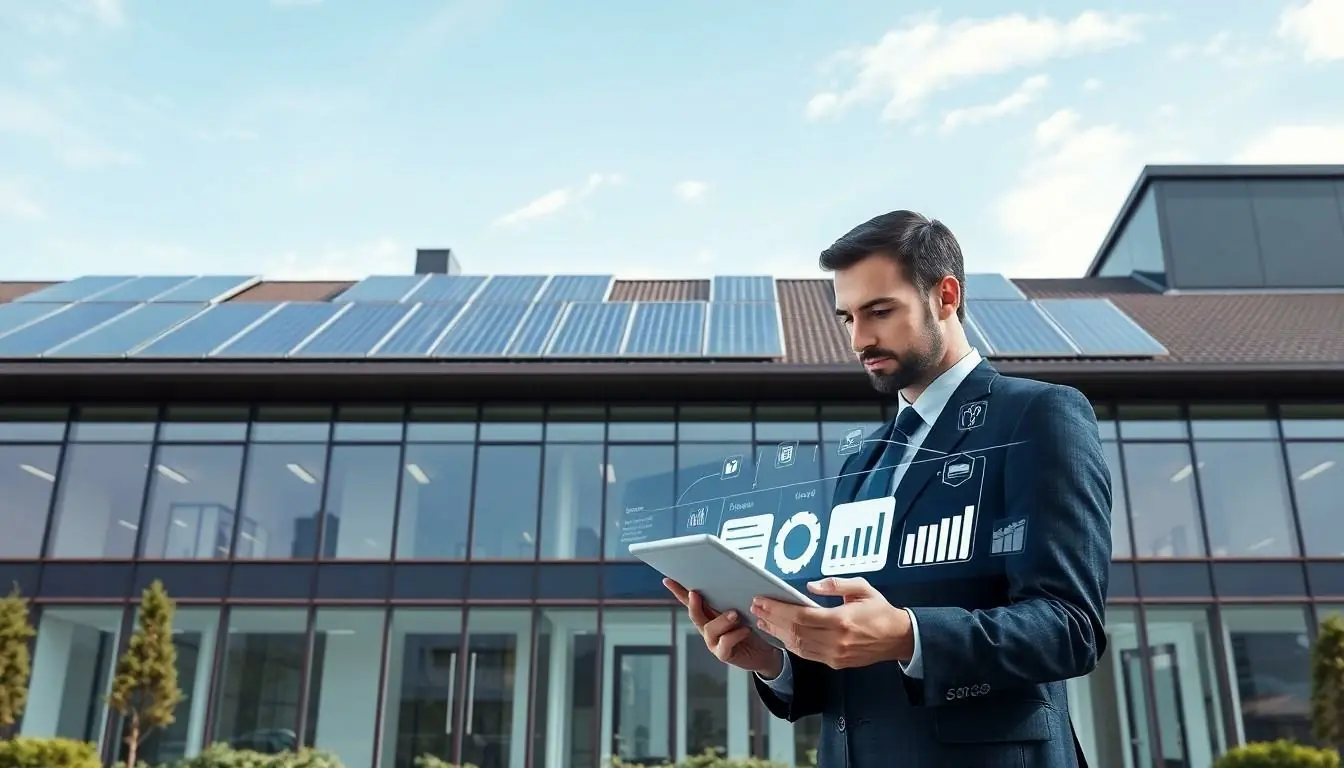In today’s fast-paced world, technology and commercial real estate have become the ultimate power couple. Think of them as the Batman and Robin of the business landscape, swooping in to save the day while transforming how companies operate. From smart buildings to virtual leasing, they’re redefining the very essence of workspace.
But what’s driving this dynamic duo? It’s not just about fancy gadgets and sleek designs; it’s about efficiency, sustainability, and a sprinkle of innovation. As businesses adapt to the digital age, they’re realizing that the right tech can turn a mundane office into a productivity powerhouse. Whether you’re a seasoned investor or just dipping your toes into the market, understanding this synergy is key to staying ahead. Buckle up as we dive into the fascinating world of technology in commercial real estate and explore how it’s shaping the future of work.
Table of Contents
ToggleOverview of Technology Commercial Real Estate
Technology commercial real estate refers to properties specifically designed or adapted to accommodate technology firms and their unique operational needs. These properties include office spaces, research and development facilities, and manufacturing sites that integrate advanced technological features.
Definition and Scope
Technology commercial real estate encompasses properties utilized by tech-driven companies. This includes software development centers, data centers, and co-working spaces that serve startups and established firms alike. Flexibility characterizes these spaces, with layouts supporting collaboration and innovation. Smart technologies enhance efficiency in building management and energy consumption. The scope also extends to real estate investment trusts (REITs) focused on tech properties, indicating a growing niche within the broader market.
Importance in Today’s Market
Understanding technology commercial real estate holds critical importance for investors and businesses alike. Investors seek opportunities in properties that leverage the latest technological advancements to attract top-tier tenants. Demand for flexible office spaces has surged, driven by remote work trends and hybrid models. Businesses increasingly focus on sustainability, where tech-enhanced buildings reduce carbon footprints. Analyzing market trends reveals that technology integration aligns with evolving tenant expectations, making it essential for long-term success.
Key Technologies Shaping Commercial Real Estate

Technology transforms commercial real estate by enhancing efficiency and tenant experiences. Notable advancements enable smarter and more adaptable spaces.
Smart Building Technology
Smart building technology enhances energy efficiency and occupant comfort. Automated systems manage lighting, heating, and cooling, creating responsive environments. Buildings equipped with sensors optimize resource usage by adjusting conditions based on occupancy. These advancements contribute to sustainability goals by reducing energy consumption. Additionally, integrating IoT devices allows for real-time monitoring, improving maintenance processes. The blend of comfort and efficiency makes smart buildings an attractive option for investors focused on long-term viability.
Property Management Software
Property management software streamlines operations for real estate owners. Systems enable efficient tracking of rent collections, maintenance requests, and tenant communications. These platforms facilitate data analysis, helping owners make informed decisions about property investments. User-friendly dashboards provide insights into operational performance, improving profitability. Furthermore, automation features reduce manual workload, allowing property managers to focus on tenant relations. Integrating this technology offers a competitive advantage in managing diverse properties efficiently.
Virtual and Augmented Reality
Virtual and augmented reality revolutionize the property viewing experience. Technology allows potential tenants to explore spaces without physical visits. Interactive virtual tours showcase properties, highlighting key features and layouts. This immersive experience attracts a broader audience and accelerates decision-making. Augmented reality tools enhance on-site visits by overlaying digital information onto physical spaces. Investors leveraging these technologies can better meet tenant needs, increasing occupancy rates and diminishing vacancy periods.
Impact of Technology on Real Estate Transactions
Technology profoundly impacts real estate transactions, streamlining processes and enhancing accessibility for all stakeholders. Innovations reshape market dynamics and enhance efficiency.
Online Marketplaces
Online marketplaces revolutionize the way commercial properties are bought, sold, and leased. These platforms allow users to browse thousands of listings, compare properties, and connect with brokers. Instant access to data fosters transparency, enabling buyers to make informed decisions. Many online platforms offer tools like virtual tours, which enhance the viewing experience without physical presence. Additionally, property analytics provided on these platforms help identify trends and optimal investment opportunities. In 2023, online transactions accounted for approximately 30% of all commercial real estate deals, showcasing their growing significance.
Blockchain in Real Estate
Blockchain technology introduces significant changes to real estate transactions. Through secure, decentralized ledgers, blockchain facilitates transparent and efficient record-keeping. It enhances security by reducing fraud risks associated with traditional transactions. Smart contracts automate agreements between parties, ensuring compliance and speeding up closing processes. By 2025, an estimated 25% of commercial transactions could utilize blockchain solutions. This technology streamlines title transfers and enhances trust among buyers and sellers, leading to faster deals and reduced costs.
Challenges in Adopting Technology
Adopting technology in commercial real estate presents various challenges. Some revolve around costs, while others focus on data security.
Cost Considerations
Costs associated with implementing advanced technologies can be significant. Investments in smart building systems, property management software, and virtual reality tools often entail high upfront expenses. Real estate firms must evaluate their budgets carefully to prioritize technology upgrades that deliver a strong return on investment. Ongoing maintenance and training costs also contribute to the overall financial impact, making it crucial to weigh immediate benefits against long-term financial commitment. Investors recognize that while technology integration can boost tenant satisfaction and efficiency, it requires a well-planned financial strategy.
Data Security Issues
Data security poses a critical concern for commercial real estate firms. Sensitive information related to tenants and transactions could be at risk due to cyber threats. With the increasing reliance on cloud-based services and digital platforms, safeguarding data becomes essential. Implementing robust security measures such as encryption and regular audits can mitigate risks. Moreover, educating employees about best practices enhances the overall security posture. As technology evolves, staying ahead of potential vulnerabilities remains a top priority for real estate businesses to protect their assets and maintain tenant trust.
Future Trends in Technology Commercial Real Estate
The landscape of technology commercial real estate is evolving rapidly. Significant trends are on the horizon, including the integration of AI and machine learning, along with a focus on sustainability and green technologies.
Integration of AI and Machine Learning
AI and machine learning play pivotal roles in optimizing operations within commercial real estate. Smart algorithms analyze market trends to provide insights that improve investment strategies. Automation enhances property management, streamlining maintenance requests and reducing response times for tenants. Predictive analytics allow property owners to anticipate tenant needs, which fosters better engagement and satisfaction. AI-driven tools can also assist in determining optimal pricing strategies based on real-time data. By 2025, over 30% of commercial properties may incorporate AI technologies, significantly influencing market dynamics.
Sustainability and Green Technologies
Sustainability remains a primary focus for technology commercial real estate. Eco-friendly building materials are gaining traction, reflecting a growing commitment to environmental stewardship. Energy-efficient designs now prioritize natural lighting and smart HVAC systems, resulting in reduced operational costs. Advanced green technologies, such as solar panels and rainwater harvesting systems, further enhance sustainability efforts. In 2023, approximately 40% of new commercial buildings targeted LEED certification, emphasizing this trend’s significance. Embracing these innovations not only attracts environmentally conscious tenants but also positions properties favorably in a competitive market.
The intersection of technology and commercial real estate represents a transformative force in the industry. As businesses adapt to new demands for flexibility and sustainability, technology commercial real estate is poised for significant growth. Investors who recognize this shift can capitalize on opportunities that leverage advanced technologies to attract high-quality tenants.
With innovations like smart buildings and online transaction platforms, the landscape is evolving rapidly. Embracing these changes not only enhances operational efficiency but also improves tenant experiences. As the market continues to evolve, staying informed about technological advancements will be essential for success in commercial real estate.





